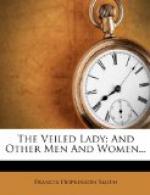Only three pairs of eyes now followed the movements of my brush, the crowd having fallen back out of respect for the young man’s rank, Yusuf having communicated that fact to those who had not recognized him.
When the light changed—and it changed unusually early that morning, about two hours ahead of time (I helped)—I said to the prince:
“It may interest you to see me finish a sketch in color. Come with me as far as Suleiman. We can sit quite out of the sun up a little back street under a wall, and away from everybody. I began the drawing yesterday. See!” and I uncovered the canvas.
“Ah, Suleimanyeh! The most beautiful of all our mosques. Yes, certainly I’ll go.”
Joe dug his knuckles into my thigh, under pretence of steadying himself—he was squatting beside me like a frog, helping with the water-cups—and gasped: “No; don’t take him—please, effendi! No— no—”
I brushed Joe aside and continued: “We can send for coffee and spend the afternoon. I’ll have some chairs brought from the cafe. Pick up everything, Joe, and come along.”
On the way to the crooked, break-neck street my thoughts went racing through my head. On one side, perhaps, a tap on the shoulder in the middle of the night; half a yard of catgut in the hands of a Bashi-Bazouk; an appeal to our consul, with the consciousness of having meddled with something that did not concern me. On the other a pair of tear-stained, pleading eyes. Not my eyes—not the eyes of anybody that I knew—but the kind that raise the devil even in the heart of a staid old painter like myself.
Joe followed, with downcast gaze. He, too, was scheming. He could not protest before the prince, nor before Yusuf. That would imply previous knowledge of the danger lurking in the vicinity of the old wall. His was the devil and the deep sea. Not to tell the prince of Yuleima’s whereabouts, after their combined search for her, and the fees the prince had paid him, would be as cruel as it was disloyal. To assist in Mahmoud’s finding her would bring down upon his own head—if it was still on his shoulders—the wrath of the chief of police, as well as the power behind him.
Once under the shadow of the wall, the trap unpacked, easel and umbrella up, and water-bottle filled, Joe started his windmill, paused at the third kotow, looked me straight in the eye, and, with a tone in his voice, as if he had at last come to some conclusion, made this request:
“I have no eat breakfast, effendi—very hungry— you please permit Joe go cafe with Yusuf—we stay one hour, no more. Then I bring coffee. You see me when I come—I bring the coffee myselluf.”
He could not have pleased me more. How to get rid of them both was what had been bothering me.
I painted on, both of us backed into the low gate with the sliding panel, my eyes on the mosque, my ears open for the slightest sound. We talked of the wonderful architecture of the East, of the taper of the minarets, of the grace and dignity of the priests, of the social life of the people, I leading and he following, until I had brought the conversation down to the question:




